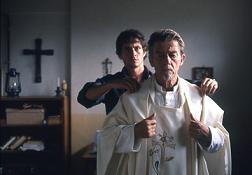 In “Premonition,” creaky stairs, dramatic music, and strange spiritual overtones try to create scares where there are none. This technique proves particularly weary in a church scene that has Sandra Bullock’s Linda Hansen seeking advice from a priest who, huddled in a grey chamber of pews, describes his theory of nightmares brought to life.
In “Premonition,” creaky stairs, dramatic music, and strange spiritual overtones try to create scares where there are none. This technique proves particularly weary in a church scene that has Sandra Bullock’s Linda Hansen seeking advice from a priest who, huddled in a grey chamber of pews, describes his theory of nightmares brought to life.
His theory is the premonition of the title, derived from Latin and defined as “warning in advance.” Linda’s premonitions are warnings because her husband, who is played by “Nip/Tuck’s” Julian McMahon, might be cheating on her with Amber Valetta. And more troublingly, he is dead on some days but alive on others.
The commercials suggest an overlong episode of “The Twilight Zone” with the dead man rising and Bullock in “The Net” mode trying to piece it all together. Rather, Linda’s days are out of order, and she lives his death before it happens. Not because of a freaky scientific time lapse, not because she’s déjà vu-ing in the worst way possible, but because she’s lost her faith.
And so the church comes in, first with the priest ominously intoning “Linda … it’s been a long time,” then proceeding to define faith as “belief in something beyond yourself,” and finally diagnosing Linda as an empty vessel waiting to be filled. But with what exactly? One thing the film never really addresses is just how Linda’s supposedly empty life (she has a distant relationship with her husband but a loving one with her two young daughters) has contributed to a series of spookily prophetic visions of her husband’s death.
The movie is shot like a nightmare, the creepiest elements being a weird cat clock that ticks out the time with crossed ceramic eyes and chain-like cuts that disfigure Linda’s daughter’s face. Linda is told of her husband’s death a day after the fatal accident, sent to a creepy looking therapist who labels her literally disordered existence as “obviously dealing with inconsistencies” (you think?), and shut up in what looks like a mental institution.
This particular sequence is never explained or revisited. But it seems, like all the supposedly Hitchcockian elements throws in the mix, like an attempt to up the scare factor. All the while Linda’s mother (Kate Nelligan) and friend (Nia Long) putter around looking worried and pretending they play characters of actual importance.
The really interesting aspect is the notion of premonition, which falls flat–not unlike Jim Carrey’s potentially fascinating but ultimately dreadful vehicle “The Number 23.” The latter is about the ways in which memory lapse can destroy a family; both films delve into dark sides that overtake seemingly untroubled existences.
Though Carrey, thank goodness, doesn’t run crying to his neglected spiritual leader, “Premonition” is still the better movie because it at least tries to make sense of what one might do if given the chance to change a relationship (even if the inevitable outcome is tragic). It’s too bad that the filmmakers spend more time trying to spook us and less time letting us get to know the characters so we can ultimately care about their fate.


